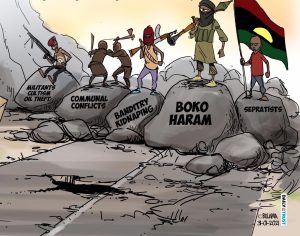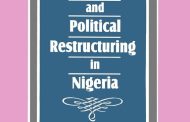By Adagbo ONOJA
Nigeria is experiencing its worst encounter with nation-building. The most frightening dimension of this moment is the experience of physical violence across the country. Right now, the siege on Plateau is the one that has caught the attention of everyone. But no less is the cycle of violence in the Northeast, the Northwest, the East and the Southsouth.
At the centre of the bloodletting is the unknown gunmen phenomenon or the actorness narrativised as Fulani herdsman. Like every other concept, this concept too has millions of meanings. In the Northeast, they are terrorists. In the Northwest, they are bandits. In the Northcentral, they are Jihadists perceived to be on to an agenda of displacing the indigenous population from ancestral lands. In the forests in the East and Southwest, their name changes to Fulani herdsmen on a mission of infiltration and occupation.

Unmistakable indicators of the collapse of the existing order or consensus and the imperative for the construction of a new order, an urgent elite responsibility! Credit: Daily Trust
Each of the naming politics is a product of a respective theory. One theory is that these are renegade fighters unfolding across Africa in the aftermath of the killing of Saddam Hussein and Muammar Gaddafi under whom these operatives were given sophisticated training that enable them to carry out scorched-earth operations without conventional militaries being able to stop them. The leading proponent of this theory is Muhammad Buhari under whose Presidency the phenomenon became most entrenched.
There is the theory of Fulanisation which argues that, tired of nomadism, Fulanis have decided or been invited from across Africa to make Nigeria home. And that this cannot but be a violent process encompassing Islamisation. Chief Obasanjo has been heard on this before. It is not clear if he still stands on this.
There is also the theory of the wave of violence as a CIA move against Nigeria at last. This has gained currency in the social media of late following testimonies and practical geopolitical testimonies in the US.
There is also the Fulani-modernity crisis argument. This theory says that the violence going on in Nigeria is a product of Fulani reaction to bitter or stressful modernisation. Testimonies of Police extortion, air Force strafing, problems of getting justice and cattle rustling are deployed to support this theory. Sheikh Gumi can be understood to be the leading voice here.
We cannot forget the collusion thesis by which it is meant that the wave of violence would never have been possible if the military and other members of the national security complex were not in bed with the invading mercenary army. General T. Y Danjuma is the key proponent of this lens.
The theories and theorists are many and it could degenerate into a boring resume to list all of them. So, one more of it before we move this piece forward.

Did the Buhari electoral machine import marauders in 2014 or are they renegade fighters? Which is which? Credit: Bulama
It is the theory most associated with Nasir-el Rufai and a former National Secretary of one of the parties whose name escapes immediate recollection. What each of these gentlemen said can be merged into the notion that what constitute the mercenary army are invitees of the Buhari machine in 2014 in anticipation of another defeat and a violent contestation of that. Naira el-rufai’s version of this varies slightly in that he was specific about the arrangement being a Kaduna State Government initiative in pacifying Fulanis who lost herds to a crisis. What unifies their entry point is the idea of people in Nigeria who knew of and were willing, for whatever reasons, to adopt such a strategy.
So, which of these theories is telling us the truth?
That’s an epistemologically untenable question since theories are neither right nor wrong. A theory becomes temporarily right or wrong if and when it becomes the most popular frame of reference for collective action. For a theory to become so popular, it has to be canvassed or hegemonised. A theory that is made hegemonic today can also collapse tomorrow, depending on how hardworking its protagonists are in making a particular theory to stay dominant.
In other words, theories are not important because they tell us the truth. Every theory is a product of a pragmatic calculus. Theories are, therefore, not about the truth or untruth. Theories are important because they are power projects in that they can be projected to a level where it grips everyone as self-evident truth. At such a point, nobody would even remember that a theory, thesis or an argument came from somewhere at some point because it has become naturalised, seen as an innocent explanation. As such, a hegemonic theory makes winners of its proponents. That is why theories are no textbook matter but life and death issue-area.
But it is not every theory that becomes hegemonic. Only very few do. The difference between the one which becomes hegemonic and the one which doesn’t is, as explained above, a matter of its hegemonisation or the politics of transforming a theory into a dominant, gripping framework for action.
When we relate this argument to the crisis of managing the waves of physical violence across Nigeria, then what should be worrisome would not be the abundance of theories of the waves of violence but the lack of political engagement with them vis-a-vis converting any of them to a framework of popular action on the crisis. Popular action in this case equals power, the defining variable in social reality in general and the sort of impasse Nigeria is currently locked into in particular.
Instead of this politicisation of any of the theories to a hegemonic primacy, what dominates the electronic media in particular are endless regurgitation of jaded notions of how security is the responsibility of government, the sanctity of ancestral lands, the imperative of ranching and so on. Giving that level of attention to notions like these do not suggest that those who do so appreciate that we are dealing with a breakdown of the social order. A new order has not emerged but the old areas of consensus have crumbled. The evidence that they have crumbled is the volume of violence we see everywhere now.

A very good illustration of structural violence in contemporary Nigeria as a community is left with a killer water supply system. Yet, it is the story of Nigeria’s rural water supply system. Shame!
Physical violence is the dimension which has claimed a huge media share but there is also the structural dimension, best exemplified by a report last week about fear of epidemic in the Opialu community in Benue State. The story has its significance in that it is basically the story of rural Nigeria. It is the biggest manifestation of Nigeria’s confusion about what constitutes development in that, over 60 years of independence, majority of the rural population are drinking water from streams, ponds and so-called free flowing rivers.
Reactions to the Opialu story from some ideologically miserable members of elite have been to blame the community and even this online newspaper for carrying the story. The preference is for the Ostrich card – pretend that the problem does not exist. That is to make the reporting of the problem to be the bigger problem. That is falling back on the tendency to lie to oneself. It is the chilling escapism we see only in Nigeria as opposed to the basic honesty we observe elsewhere involving political leaders and leading elite members apologising profusely to the people when such a reality is uncovered. Here, it is the opposite because ‘they’ only run to the Opialus across Nigeria during elections, to tell more lies and absolve themselves of the blame. Shame!
It is very possible that individual heroism is the commoner resort because the relative heterogeneity of the elite formation in Nigeria. Still, there is something astonishing that we have not seen retired Generals occupying Aso Rock before being joined by all the powerful pastors in this country, followed by civil society leaders, the CAN, JNI, the traditional rulers, the business magnates and a host of them. If the elite cannot form a consensus in the face of dislocation, then there should be no difficulty in forgetting about Nigeria. We have not seen anywhere in history where change has occurred without some element of elite consensus, particularly in dealing with an all involving dislocation.
It is only elite consensus in this context that will amount to a synthesis of the contending claims about the origin and nature of the threat as well as a conditioning of state power to act. Elite consensus and a unified move is, right now, the only way to clarify whether the spectre of violence is due to collusion of the military as some people argue or lack of fighting capability or the war economy effect or even capture of the national security complex by whatever groups – local or foreign.

Nothing precludes elite consensus, assuming it is a foreign inspired breakdown of Nigeria is experiencing as popularly canvassed in the social media. Pix credit: Daily Trust
The elite would not have had to overcome ethno-religious and regional attachments to unite for a consensus if there were political parties in Nigeria. Such parties would take positions and give effect to it, deploying their members who would have risen above localisms to enforce party positions. Tragically, what we have in Nigeria today are no political parties but rigging machines.
As long as the elite in their various fractions are comfortable issuing impotent, individualistic press statements, Aso Rock will keep weighing the situation from the point of view of what it can profit from the anomie. It is not outrageous to say that any other president will do the same. Security is always about safety for who, when and where. That’s why those endlessly reminding us how security is the first responsibility of any government are adding no analytical value whatsoever. That’s what the Constitution says but what is security? Security too is only capable of a relational rather than a referential meaning.
Let’s conclude. Starting from a recognition that a spectre of violence is haunting Nigeria, this piece moved to take a list of how the spectre is understood theoretically, theories being the framework for every action. It further argues that there are a n there’s nothing worrisome about abundance of theories regarding the origin and character of the threat. What is worrisome is the inability of any set of protagonists to hegemonise any of the theories. It takes the position that, given the dislocatory character of the crisis (meaning that this is not an ordinary crisis but signals of the complete collapse of the existing social order in Nigeria, the only way out is elite consensus and enactment of that consensus via a strategy of occupation of the seat of power called Aso Rock.
Other than that, the government of the day will remain tempted to read the crisis from the point of what is in it for it. In other words, it is the business of the government of the day to determine what exactly the threat is and how best to contain it. But this government will not do that unless it is compelled to do so by an irresistible elite consensus and the enactment of that consensus. It will need elite pressure to do that because, throughout human history, security has never had a universal meaning. It has always been about security for who, when and where.
Individual members of the elite going on television to make static claims about who, what and why of the threat might be contributing to problem solving just as they could be performing the threats even more if there is no elite consensus. Historically, elite have been central to change and the Nigerian elite cannot escape that responsibility without becoming bystanders in world affairs as the current stalemate can lead to the evaporation of Nigeria as we know it today. They, therefore, endanger the nation and nation building if they cannot quickly overcome their share of ethno-regional and religious localisms.
Onoja, the author, is a doctoral researcher




























